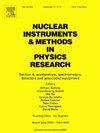基于 VHF 电子枪的高亮度 ERL-FEL 喷射器的设计
IF 1.5
3区 物理与天体物理
Q3 INSTRUMENTS & INSTRUMENTATION
Nuclear Instruments & Methods in Physics Research Section A-accelerators Spectrometers Detectors and Associated Equipment
Pub Date : 2024-11-12
DOI:10.1016/j.nima.2024.170058
引用次数: 0
摘要
在过去十年中,基于能量回收直列加速器(ERL)和自由电子激光器(FEL)结合使用超导直线加速器的第四代光源引起了广泛关注。它具有巨大的潜力,特别是在产生高功率极紫外(EUV)光源方面。本文主要介绍 ERL-FEL 注入器的物理设计,该注入器以电荷量为 100 pC 的甚高频(VHF)电子枪为基础。光束能量通过 3 芯超导低温模块加速到 10 MeV。通过 BMad 和 ASTRA 仿真,结合合并优化概念,对束流参数进行了优化。我们提出了一种新方法来评估合并部分的纵向空间电荷(LSC)效应,这种方法可以方便地应用于设计工作中。此外,我们还引入了一种新型合并。这种新型合并的性能可与之前已知的最佳 "之 "字形合并相媲美,为 ERL 中的喷射器提供了一种潜在的替代解决方案。本文章由计算机程序翻译,如有差异,请以英文原文为准。
The design of high-brightness ERL-FEL injector based on VHF electron gun
In the past decade, the fourth-generation light source based on the combination of Energy Recovery Linac (ERL) and Free-Electron Laser (FEL) using superconducting linear accelerators has garnered significant attention. It holds immense potential, particularly in generating high-power Extreme Ultraviolet (EUV) light sources. This article primarily focuses on the physical design of an injector for ERL-FEL, based on a Very High Frequency (VHF) electron gun with a charge of 100 pC. The beam energy is accelerated to 10 MeV using 3-cell superconducting cryomodule. The optimization of beam parameters is conducted through employment of BMad and ASTRA simulations, incorporating the concept of Merger optimization. The beam emittance is less than 0.6 mm mrad, and the peak current at the injector exit exceeds 18 A. We present a new method to evaluate the Longitudinal Space Charge (LSC) effects in merger sections, which can be readily applied in design work. Furthermore, we introduce a novel type of merger. The performance of this new merger is comparable to the previously known optimum, the zigzag merger, offering a potential alternative solution for injectors in ERLs.
求助全文
通过发布文献求助,成功后即可免费获取论文全文。
去求助
来源期刊
CiteScore
3.20
自引率
21.40%
发文量
787
审稿时长
1 months
期刊介绍:
Section A of Nuclear Instruments and Methods in Physics Research publishes papers on design, manufacturing and performance of scientific instruments with an emphasis on large scale facilities. This includes the development of particle accelerators, ion sources, beam transport systems and target arrangements as well as the use of secondary phenomena such as synchrotron radiation and free electron lasers. It also includes all types of instrumentation for the detection and spectrometry of radiations from high energy processes and nuclear decays, as well as instrumentation for experiments at nuclear reactors. Specialized electronics for nuclear and other types of spectrometry as well as computerization of measurements and control systems in this area also find their place in the A section.
Theoretical as well as experimental papers are accepted.

 求助内容:
求助内容: 应助结果提醒方式:
应助结果提醒方式:


